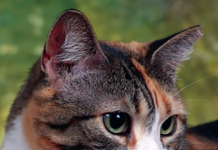Q. We have a 4-year-old female tuxedo-patterned kitty named Puff whose right eye occasionally (every few months or so) gets a little “weepy.” It stays that way for a week or so before she gets it cleaned up and then it’s fine until the next occurrence. Is this something we should be concerned about?
A. Thank you for contacting me about Puff’s problem. Ocular discharge is common in cats, and the causes of this unsightly and inconvenient phenomenon vary from relatively benign processes to serious diseases. It is important that you discuss your concerns with Puff’s veterinarian, as he/she is best prepared to address her health issues, but perhaps my pointing out a few key points would be helpful.
The first is the cat’s age. Younger cats are generally more susceptible to a variety of upper respiratory infections by both viruses and bacteria due to their immature immune systems, and it is relatively common for them to have discharge from their eyes in association with these infections.
Viral infections such as feline calicivirus and feline herpesvirus and bacterial infections such as Chlamydia (not to be confused with the sexually transmitted disease!) can cause symptoms, including discharge from the eyes and/or nose. In many cases, cats who are affected with these organisms may experience chronic, intermittent discharge from the eyes, even if they clear signs of overt disease.
Another thing to consider is the vaccination status of your kitty. There are effective vaccines for a number of causes of upper respiratory infections in cats (including feline calicivirus and feline herpesvirus). Although they may not be 100 percent effective (few vaccines are), they can significantly decrease the likelihood that a cat will become infected, and if he does, they may decrease the severity of the disease and the likelihood that he will infect other cats. (Be sure to see this issue’s cover story on feline calicivirus.) I certainly recommend discussing an appropriate vaccination plan with Puff’s veterinarian, whether this current problem is associated with an upper respiratory infection or not.
The appearance of the discharge and whether it is coming from one or both eyes can also provide clues to its cause in some cases. Generally speaking, clear, thin discharge is less concerning than yellowish, thick discharge, as the latter may suggest either a primary bacterial infection or a bacterial infection secondary to another process (such as a viral infection).
Bacterial infections may respond to antibiotics, while viral infections do not. Discharge from both eyes may suggest a diffuse, systemic problem such as a viral infection, while discharge from one eye may be seen in association with processes that are more localized (i.e., to one eye) such as a blocked nasolacrimal duct (this normal structure drains tears from the eye to the tip of the nose) or a foreign body such as plant material lodged in the eye. Allergies to inhaled substances can sometimes cause ocular discharge in cats, but in these cases the discharge would be expected from both eyes.
It is also important to look at other structures in the eye to get an idea of the general health of this important structure. Any cloudiness of the cornea (the clear covering of the eye), internal chambers of the eye or the lens (which can be seen through the pupil) or redness/swelling of the conjunctiva (pink tissue surrounding the eye) should prompt immediate attention and consultation with a veterinarian.
Other signs that should prompt immediate consultation include those that suggest discomfort of the eye, such as keeping the eye either completely or partially closed, avoiding light and/or touching the region around the eye. These signs may indicate corneal ulceration (damage to the cornea) and/or glaucoma (elevated pressure within the eye), and both are emergencies requiring immediate attention.
I hope that this is helpful. From your description, it does not sound like the situation is emergent, but it would be good to discuss these issues with Puff’s veterinarian for her well being, that of other cats and your peace of mind. Please let me know how things are going, and give Puff my most sincere regards. —Best regards, Elizabeth ❖



